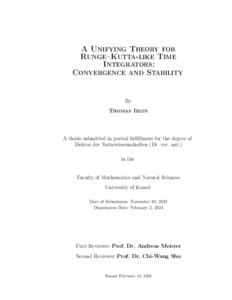| dc.date.accessioned | 2024-02-21T12:42:48Z | |
| dc.date.available | 2024-02-21T12:42:48Z | |
| dc.date.issued | 2024 | |
| dc.identifier | doi:10.17170/kobra-202402059522 | |
| dc.identifier.uri | http://hdl.handle.net/123456789/15474 | |
| dc.description.sponsorship | The dissertation was developed within the framework of a DFG project. | eng |
| dc.language.iso | eng | |
| dc.rights | Urheberrechtlich geschützt | |
| dc.rights.uri | https://rightsstatements.org/page/InC/1.0/ | |
| dc.subject | Conservative | eng |
| dc.subject | Positivity-Preserving | eng |
| dc.subject | Order Conditions | eng |
| dc.subject | Lyapunov Stability | eng |
| dc.subject | Runge-Kutta-like methods | eng |
| dc.subject | Modified Patankar Approach | eng |
| dc.subject.ddc | 510 | |
| dc.subject.ddc | 500 | |
| dc.title | A Unifying Theory for Runge-Kutta-like Time Integrators: Convergence and Stability | eng |
| dc.type | Dissertation | |
| dcterms.abstract | The work deals with two major topics concerning the numerical analysis of Runge-Kutta-like (RK-like) methods, namely their stability and order of convergence. RK-like methods differ from additive RK methods in that their coefficients are allowed to depend on the solution and the step size. As a result of this, we also refer to them as non-standard additive RK (NSARK) methods. We motivate and introduce modified Patankar (MP) schemes as a subclass of NSARK methods and emphasize their importance. The first major part of this thesis is then dedicated to providing a tool for deriving order conditions for NSARK methods. The proposed approach may yield implicit order conditions, which can be rewritten in explicit form using the NB-series of the stages. The obtained explicit order conditions can be further reduced using Gröbner bases computations. With the presented approach, it was possible for the first time to obtain conditions for the construction of 3rd and 4th order Geometric Conservative (GeCo) as well as 4th order MPRK schemes. Moreover, a new fourth order MPRK method is constructed using our theory and the order of convergence is validated numerically. The second major part is concerned with the stability of nonlinear time integrators preserving at least one linear invariant. We discus how the given approach generalizes the notion of A-stability. We are able to prove that investigating the Jacobian of the generating map is sufficient to understand the stability of the nonlinear method in a neighborhood of the steady state. This approach allows for the first time the investigation of several modified Patankar schemes such as MPRK, SSPMPRK, MPDeC, GeCo and gBBKS methods. During that analysis we additionally demonstrate that GeCo2 and gBBKS methods are not in C^2 and prove asymptotic stability for GeCo1 schemes and, for some PDRS, also for MPRK methods. In the particular case of MPRK schemes, we compute a general stability function in a way that can be easily adapted to the case of PDRS. Finally, our findings support the numerically observed robustness of MP methods while we are able to provide sharp bounds on the time step in the case of conditional stability. Last but not least, the approach from the theory of dynamic systems is used to derive a necessary condition for avoiding unrealistic oscillations of the numerical approximation. | eng |
| dcterms.accessRights | open access | |
| dcterms.creator | Izgin, Thomas | |
| dcterms.dateAccepted | 2024-02-02 | |
| dcterms.extent | 158 Seiten | |
| dc.contributor.corporatename | Kassel, Universität Kassel, Fachbereich Mathematik und Naturwissenschaften, Institut für Mathematik | |
| dc.contributor.referee | Meister, Andreas (Prof. Dr.) | |
| dc.contributor.referee | Shu, Chi-Wang (Prof. Dr.) | |
| dc.relation.projectid | DFG: ME1889/10-1 (project number 466355003) | |
| dc.subject.swd | Runge-Kutta-Verfahren | ger |
| dc.subject.swd | Entwicklung | ger |
| dc.subject.swd | Stabilität | ger |
| dc.subject.swd | Konvergenz | ger |
| dc.subject.swd | Ordnung <Mathematik> | ger |
| dc.subject.swd | Ljapunov-Stabilitätstheorie | ger |
| dc.subject.swd | Numerische Mathematik | ger |
| dc.type.version | publishedVersion | |
| kup.iskup | false | |
| ubks.epflicht | true | |

